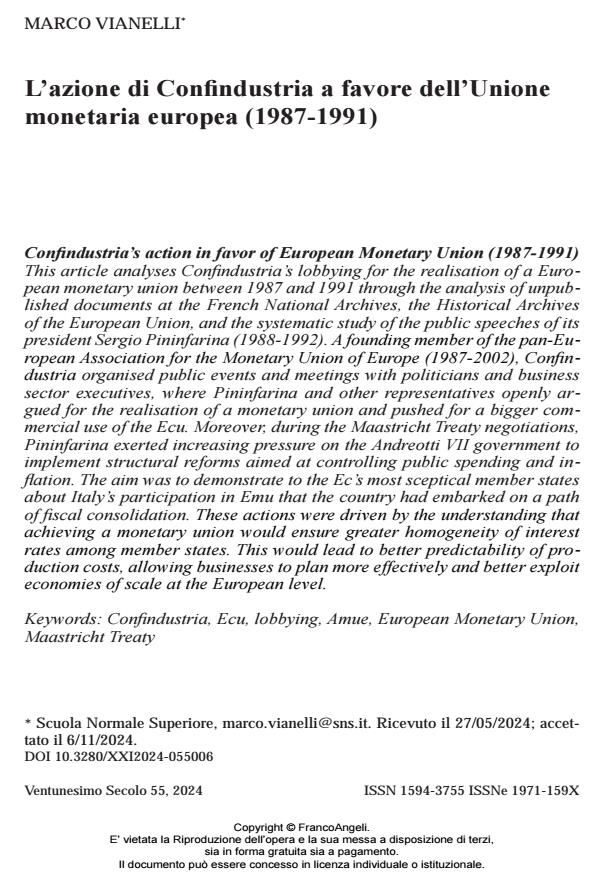L’azione di Confindustria a favore dell’Unione monetaria europea (1987-1991)
Titolo Rivista VENTUNESIMO SECOLO
Autori/Curatori Marco Vianelli
Anno di pubblicazione 2025 Fascicolo 2024/55
Lingua Italiano Numero pagine 22 P. 117-138 Dimensione file 245 KB
DOI 10.3280/XXI2024-055006
Il DOI è il codice a barre della proprietà intellettuale: per saperne di più
clicca qui
Qui sotto puoi vedere in anteprima la prima pagina di questo articolo.
Se questo articolo ti interessa, lo puoi acquistare (e scaricare in formato pdf) seguendo le facili indicazioni per acquistare il download credit. Acquista Download Credits per scaricare questo Articolo in formato PDF

FrancoAngeli è membro della Publishers International Linking Association, Inc (PILA)associazione indipendente e non profit per facilitare (attraverso i servizi tecnologici implementati da CrossRef.org) l’accesso degli studiosi ai contenuti digitali nelle pubblicazioni professionali e scientifiche
This article analyses Confindustria’s lobbying for the realisation of a European monetary union between 1987 and 1991 through the analysis of unpublished documents at the French National Archives, the Historical Archives of the European Union, and the systematic study of the public speeches of its president Sergio Pininfarina (1988-1992). A founding member of the pan-European Association for the Monetary Union of Europe (1987-2002), Confindustria organised public events and meetings with politicians and business sector executives, where Pininfarina and other representatives openly argued for the realisation of a monetary union and pushed for a bigger commercial use of the Ecu. Moreover, during the Maastricht Treaty negotiations, Pininfarina exerted increasing pressure on the Andreotti VII government to implement structural reforms aimed at controlling public spending and inflation. The aim was to demonstrate to the Ec’s most sceptical member states about Italy’s participation in Emu that the country had embarked on a path of fiscal consolidation. These actions were driven by the understanding that achieving a monetary union would ensure greater homogeneity of interest rates among member states. This would lead to better predictability of production costs, allowing businesses to plan more effectively and better exploit economies of scale at the European level.
Parole chiave:Confindustria, Ecu, lobbying, Amue, European Monetary Union, Maastricht Treaty
Marco Vianelli, L’azione di Confindustria a favore dell’Unione monetaria europea (1987-1991) in "VENTUNESIMO SECOLO" 55/2024, pp 117-138, DOI: 10.3280/XXI2024-055006